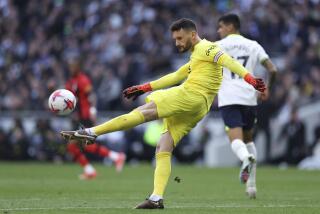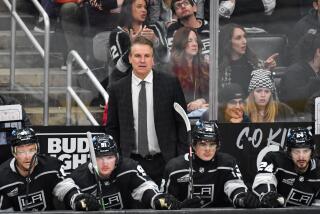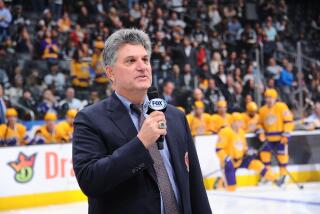THE OLYMPICS : WINTER GAMES AT ALBERTVILLE : Looking Out for No. 1 : Lindros Shrugs Off Quebec Controversy. For the Moment, He Simply Wants to Enjoy the Games.
- Share via
MERIBEL, France — His manner is remarkably calm for someone involved in such a far-reaching controversy.
In Canada, a nation fractured by tension between the English-speaking majority and a French-speaking minority in the Province of Quebec, Eric Lindros’ refusal to sign with the Nordiques last June was declared no less than “a nasty emotional drama with political overtones that augur poorly for national unity” by the Ottawa Citizen, a newspaper in Canada’s capital.
Although he says he never intended it, Lindros’ defiance of the NHL’s draft system has become a metaphor for Quebec’s defiance of the federal government, his determination not to play in Quebec symbolic of the arrogance of Canada.
“If Canada flies apart in the next few years, part of the reason will be a 6-5 kid on skates named Eric Lindros,” Peter Maser wrote in the Citizen. “The perception among Quebeckers is that he has not only spurned their affection, but has given the back of his hand to their language and culture. . . . If he sticks to his word, rebuilding Canada will be a little more difficult than it was before.”
It is a hefty burden to carry, even on shoulders as broad and strong as those sculpted onto Lindros’ 228-pound frame. If the future of Canada is on his shoulders at 18, what will be his responsibility at 19? World peace?
Lindros has given varied explanations for his refusal to play for Quebec, which chose him first overall. At times he has mentioned the limited salary and endorsement opportunities available with a small-market club. He also has said that Nordique executives mistreat their players, citing their bitter salary dispute with star center Joe Sakic.
But in one respect he has not wavered, and that’s in saying his decisions to return to his junior team and then to play for Team Canada in the Olympic Games represent his way of looking out for himself, devoid of political implications.
“I don’t think I represent Canada, or the conflict that there is in Canada,” Lindros said as he prepared for Canada’s Olympic opener Saturday against France. “I think I represent a player-management relationship. All I want to do is be in a situation where I’m happy and treated well and given the opportunity to play. When you’re respected and you don’t have to worry about things you shouldn’t have to worry about, your play is going to pick up.
“I’m a regular person. The bottom line is we’re all human. We’re all put on this planet for some reason. I guess I’m here to sell papers. I just go out and have fun, just like everyone else. I’m no different than you were as a kid.”
But not every kid earned $500,000 in endorsements last year and stands to earn millions should his strength and scoring boost Canada to an Olympic medal. Nor is every kid pictured on trading cards that sell at a premium. And few kids create as big a stir as Lindros, whose junior club, the Oshawa Generals, had to expand its arena’s seating to accommodate reporters. The facility was dubbed “the Lindros box.”
If Lindros’ refusal to play for the Nordiques has become larger than a mere hockey decision, it may be because he has always done everything in a big way, from scoring 132 goals when he was 7 to growing so tall he needs custom-made hockey pants.
In a country where hockey remains akin to a religion, Lindros practically has been anointed a god since childhood. His mother, Bonnie, once said she realized the notoriety in store for her son when he was 9 and easily outplaying his peers.
“I woke up in bed and started shaking,” she said.
Lindros’ impact extends beyond scoring, although he displayed ample skill in winning the 1990-91 Ontario Hockey League scoring title with 149 points in 57 games. He’s also not hesitant about hurling checks with gusto, having accumulated 189 penalty minutes that season. “It’s great to have a guy with that type of presence,” Canadian goaltender Sean Burke said. “That’s sometimes worth a goal or two to our team, even if he doesn’t score a goal.”
Booed at the Montreal Forum last August during a pre-Canada Cup exhibition game, Lindros later earned a standing ovation by scoring two goals and an assist and delivering a thunderous check on Team USA defenseman Craig Wolanin. During Canada’s tournament triumph, Lindros collected three goals and two assists in eight games--besides throwing one check that broke a Czechoslovakian player’s collarbone, another that dislocated a Swede’s shoulder and a third on a Soviet that shattered the protective plexiglass at rinkside.
“His size is overwhelming,” said King center Wayne Gretzky, Lindros’ Canada Cup teammate. “He’s the first breed of athlete that’s come into the sport like a Wilt Chamberlain. He came in and was not only big, but had the finesse of a small player. Mario (Lemieux) has finesse, but by no means is he a physical player. Eric has finesse and size.”
Lindros also has Gretzky’s blessing as the NHL’s next showcase player, a torch Gretzky carries with increasing reluctance. Lindros has long been called “the Next One,” a play on Gretzky’s nickname of “the Great One.”
But exactly when Lindros will move into the line of succession is unclear. Gretzky recently predicted that Lindros would be in the NHL next year, but Lindros remained noncommittal when asked this week about his future.
As for those who portray his rejection of the Nordiques as anti-French, he studied the language from Grade 4 through Grade 10 and is drawing on that here.
“If (the Nordiques) want to move me, they want to move me,” he said. “If they don’t, they’re going to lose out on the bottom line because the window is going to start to close. . . . Right now they’ve got a chance to ship me off to any other team they want to.”
The Nordiques retain Lindros’ rights for two years. If they don’t sign him or trade him by the 1993 draft, he will be eligible to be drafted again. Lindros considers their unwillingness to trade him an attempt to browbeat him and says he won’t change his mind.
Those who doubt his resolve can examine a precedent: When he was claimed by the junior team in Sault-Ste. Marie, a city in northern Ontario, in the midget (15- and 16-year-old) draft, he instead went to Farmington, Mich., to play. His refusal to report, based on his parents’ contention that Sault-Ste. Marie’s remoteness would force him to make so many long trips that his schooling would suffer, forced the Ontario Hockey League to change a rule that prohibited teams from trading first-round draft picks. It was immediately called “the Lindros rule.”
“You look at John Elway and how he was traded (from Baltimore to Denver of the NFL). I don’t know the time frame, but basically it was right after he was drafted because he said he wouldn’t report,” Lindros said.
“I don’t think the language has anything to do with it at all. It has nothing to do with the people. It just has to do with the management. Right now I don’t want to talk about it. I don’t think questions along those lines are anything I really want to think about for the next couple of weeks. I’m here to play hockey in the Olympic Games. . . . I’m going to have some fun. I’ve been having fun all year. My spirit hasn’t been broken at all.”
In the world junior tournament, Lindros for once failed to meet the lofty expectations set for him. Although he had two goals and six assists in seven games, he was criticized for failing to show leadership. That he had led Canada to the previous two titles was forgotten, and he was lustily booed. Ignored, too, was that the exhaustion of travel and the flu had sapped his strength.
After Lindros returned to the Canadian Olympic team, Coach Dave King gave him a few days off before leaving for Europe. The rest rejuvenated him, as shown by his strong performance in helping Canada win the Globen Cup, a pre-Olympic tournament last week in Stockholm. Canada is projected as an Olympic bronze medalist, which would be the country’s first hockey medal since a bronze in 1968 at Grenoble, France.
King faced a volatile situation when Lindros joined the Olympic team in late October, nearly three months after the team had assembled. King also had to make allowances for Lindros’ absences while playing for the world junior team and for Oshawa, but Lindros repaid King’s generosity by scoring 19 goals and 35 points in 24 games with the Olympic team.
“It’s a delicate thing for the coaches to juggle that a little bit,” King said, “so that you make it easier for him to do that. And he’s fit in well. He’s done a good job and in the way he’s played, he has the respect of his teammates.”
And of his coach.
“It’s a rocky road he’s chosen to take,” King said. “It’s put a lot more demands on him, and it hasn’t been easy for him, but he’s handled it pretty well.”
While others discuss the social and political ramifications of his every move, Lindros is determined to enjoy himself.
“I’m still the kid,” Lindros said with a smile. “I was out there riding a sleigh (Tuesday) night at 10:30, going downhill. We were all out there having fun together. . . . “I accepted (a place on the Olympic team) as a great second place to be. It’s been an unbelievable experience. If this is second-best, I can’t wait to see the first.”
More to Read
Go beyond the scoreboard
Get the latest on L.A.'s teams in the daily Sports Report newsletter.
You may occasionally receive promotional content from the Los Angeles Times.







